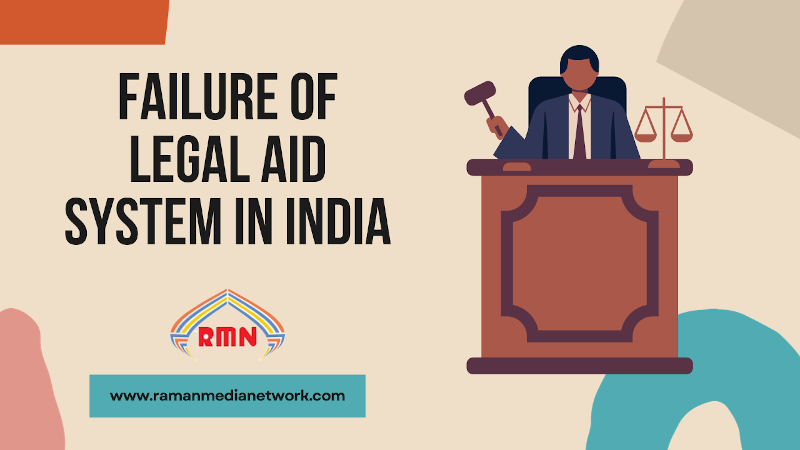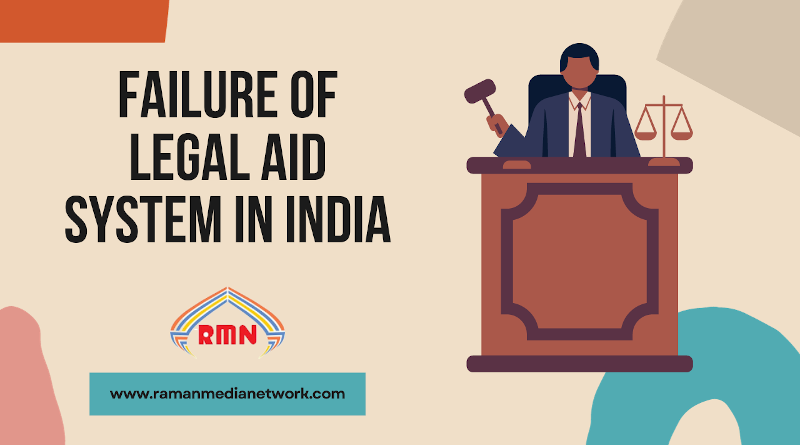Chief Justice Informed About Failure of Legal Aid System in India

Chief Justice Informed About Failure of Legal Aid System in India
In order to make an efficient justice delivery system, the lawyers and judges need to be domain experts like we have specialized doctors in the medical profession.
I recently sent a representation to the Chief Justice of India who is also the Patron-in-Chief of the National Legal Services Authority (NALSA) to inform him about the failure of the legal aid system in India. A part of the representation is given below.
By Rakesh Raman
As a journalist and social activist, I have to interact with different members of the legal fraternity as I keep getting threats from criminals for the editorial and anti-corruption work that I do.
After my interaction with the lawyers, I have experienced that most lawyers who are associated with the legal services authorities to provide free services are not quite qualified to handle their cases professionally.
Their knowledge of technology is quite limited and they lack English language skills. They only provide some template-based services to their clients who are mostly uneducated. Like most lawyers and judges in India, the pro bono lawyers also do not possess domain knowledge to handle a case.
The cases are admitted, dismissed, or decided with the whims of a judge rather than the contents of a case, as most judges do not read or understand the subject of the case that they handle.
Moreover, petitions, judgments, and other court documents are written in such a haphazard manner in broken English that it is difficult to make heads or tails of the convoluted sentences written in them.
[ You can click here to study the research report “Risks of English Language Limitations in Indian Judiciary” that I compiled and released recently. ]
If you evaluate the judgments of even the Supreme Court through an Artificial Intelligence (AI)-based expert system, you will find that almost all the judgments, dismissal of petitions, or delays in decisions are either wrong or biased.
The situation is worse in the high courts and lower courts where judges take casual decisions. I have explained some of these abnormalities in the Indian judicial system in a research paper that I compiled and released recently. [ You can click here to study the research paper. ]
TRAINING TO LAWYERS AND JUDGES
It is observed that most lawyers and judges lack domain expertise in the emerging areas of litigation. Moreover, they are averse to the use of technology and not eager to learn English which is the most common language used in courts.
I can tell you from my experience that since lawyers do not understand English, they use the English alphabet to write in Hindi. For example, if they have to write “I have read the paper,” they would write “maine kagaz padh liya hai” which is written in Hindi as “मैंने पेपर पढ़ लिया है.” This is an insult to the language and such lawyers who cannot communicate in proper English should not be allowed to stay in the legal profession.
Likewise, most lawyers cannot use technology to interact with their clients. While video conferencing is a useful facility which is being promoted in Indian courts, the lawyers still force people to meet them in their court offices or homes to explain their cases. Such lawyers cannot and do not read even a single sentence written in digital documents which usually also contain hyperlinks.
After taking some basic inputs in local language from the clients or people who meet them to take free or paid legal services, the lawyers use copy-paste methods to write some vague petitions or responses from old cases, which are neither understood by the lawyers themselves nor by the judges. Everything in Indian courts is going topsy-turvy.
As the legal aid lawyers do not read inputs given through emails and refuse to use video conferencing to understand the cases, they still force litigants to travel and appear before them in their homes or offices. Moreover, they waste reams of paper to write and accept court documents which can easily be delivered as digital documents such as PDF files.
Thus, these irresponsible members of the judiciary not only contribute toward environmental damage but they also cause painful inconvenience to the litigants who find it difficult to commute or travel. The litigants do not have the option to use digital channels for communications. Since there is negligible use of technology in the Indian judicial system, the digital courts or e-courts concept has completely failed in the country.
The Chief Justice of India – who is also the Patron-in-Chief of the National Legal Services Authority (NALSA) – may be trying to promote the legal aid services and the use of technology by lawyers and judges. However, you can see that there is not even an iota of change as the courts continue to work in an obsolete, archaic environment.
If the Supreme Court or the government’s justice departments really want to modernize the legal aid system or the overall judicial system, they need to select lawyers who understand technology, English, and who have sufficient knowledge of the subjects of their cases. In order to make an efficient justice delivery system, the lawyers and judges need to be domain experts like we have specialized doctors in the medical profession.
Therefore, the Supreme Court and the government should make separate departments which should have domain experts and English language experts to provide training to the lawyers and judges.
Actually, such specialized training should be provided to students in the law colleges and universities. But unfortunately domain knowledge and professional English skills are not part of the curriculum in the law institutes.
By Rakesh Raman, who is a national award-winning journalist and social activist. He is the founder of the humanitarian organization RMN Foundation which is working in diverse areas to help the disadvantaged and distressed people in the society.




